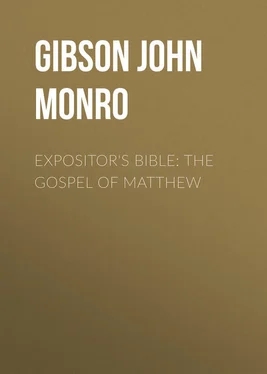John Gibson - Expositor's Bible - The Gospel of Matthew
Здесь есть возможность читать онлайн «John Gibson - Expositor's Bible - The Gospel of Matthew» — ознакомительный отрывок электронной книги совершенно бесплатно, а после прочтения отрывка купить полную версию. В некоторых случаях можно слушать аудио, скачать через торрент в формате fb2 и присутствует краткое содержание. Издательство: Иностранный паблик, Жанр: foreign_religion, foreign_antique, foreign_prose, на английском языке. Описание произведения, (предисловие) а так же отзывы посетителей доступны на портале библиотеки ЛибКат.
- Название:Expositor's Bible: The Gospel of Matthew
- Автор:
- Издательство:Иностранный паблик
- Жанр:
- Год:неизвестен
- ISBN:нет данных
- Рейтинг книги:5 / 5. Голосов: 1
-
Избранное:Добавить в избранное
- Отзывы:
-
Ваша оценка:
- 100
- 1
- 2
- 3
- 4
- 5
Expositor's Bible: The Gospel of Matthew: краткое содержание, описание и аннотация
Предлагаем к чтению аннотацию, описание, краткое содержание или предисловие (зависит от того, что написал сам автор книги «Expositor's Bible: The Gospel of Matthew»). Если вы не нашли необходимую информацию о книге — напишите в комментариях, мы постараемся отыскать её.
Expositor's Bible: The Gospel of Matthew — читать онлайн ознакомительный отрывок
Ниже представлен текст книги, разбитый по страницам. Система сохранения места последней прочитанной страницы, позволяет с удобством читать онлайн бесплатно книгу «Expositor's Bible: The Gospel of Matthew», без необходимости каждый раз заново искать на чём Вы остановились. Поставьте закладку, и сможете в любой момент перейти на страницу, на которой закончили чтение.
Интервал:
Закладка:
The gifts of the East no doubt provided the means of securing a refuge in the South and West. That Egypt gave the fugitives a friendly welcome, and a safe retreat so long as the danger remained, is obvious; but here again we are left without detail. The one thing which the Evangelist wishes to impress upon us is the parallel between the experience of Israel and Israel's Holy One. Israel of the Old Testament, born in Palestine, had to flee into Egypt. When the time was ripe for return, the way was opened for it; and thus the prophet speaks of it in the name of the Lord: "When Israel was a child, then I loved him, and called My son out of Egypt." Now that the Holy One of Israel has come to fulfil old Israel's destiny, the prophetic word, which had been only partially realised in the history of the nation, is fulfilled in the history of the Anointed One. Hence, just as it happened with the nation, so did it happen with the nation's representative and King: born in His own land, He had to flee into Egypt, and remain there till God brought Him out, and set Him in His land again.
Other points of agreement with the prophetic word are mentioned. It is worthy of note that they are all connected with the dark side of prophecy concerning the Messiah. The reason for this will readily appear on reflection. The Scribes and Pharisees were insistent enough on the bright side, the side that favoured their ideas of a great king, who should rescue the people from the Roman yoke, and found a great world-kingdom, after the manner of Herod the Great or of Cæsar the mighty. So there was no need to bring strongly out that side of prophecy which foretold of the glories of the coming King. But the sad side had been entirely neglected. It is this, accordingly, which the Evangelist is prompted to illustrate.
It was, indeed, in itself an occasion of stumbling that the King of Israel should have to flee to Egypt. But why should one stumble at it, who looked at the course of Israel's history as a nation, in the light the prophets threw upon it? It was an occasion of stumbling that His birth in Bethlehem should bring with it such sorrow and anguish; but why wonder at it when so great a prophet as Jeremiah so touchingly speaks of the voice heard in Ramah, "Rachel weeping for her children and would not be comforted," – a thought of exquisite beauty and pathos as Jeremiah used it in reference to the banished ones of his day, but of still deeper pathos as now fulfilled in the sorrow at Ramah, over the massacre of her innocents, when not Israel but Israel's Holy One is banished from the land of His birth. Again, it was an occasion of stumbling that the King of Israel, instead of growing up in majesty in the midst of the Court and the capital, should retire into obscurity in the little village of Nazareth, and for many years be unheard of by the great ones of the land; but why wonder at it when the prophets again and again represent Him as growing up in this very way, as "a root out of a dry ground," as a twig or "shoot out of the stem of Jesse," growing up "out of His place," and attracting no attention while He grew. Such is the meaning of the words translated, "He shall be called a Nazarene." This does not appear in our language; hence the difficulty which many have found in this reference, there being no passage in any of the prophets where the Christ is spoken of as a Nazarene; but the word to Hebrew ears at once suggests the Hebrew for "Branch," continually applied to Him in the prophets, and especially connected with the idea of His quiet and silent growth, aloof from the throng and unnoticed by the great.
This completes, appropriately, the sketch of His reception. Unthought of by His own, till strangers sought Him; a source of trouble to them when they heard of Him; His life threatened by the occupant, for the time, of David's throne, He is saved only by exile, and on returning to His people passes out of notice: and the great world moves on, all unconscious and unconcerned, whilst its Saviour-King is preparing, in the obscurity of His village home, for the great work of winning a lost world back to God.
III.
HIS HERALD
THIRTY years have gone since all Jerusalem was in trouble at the rumour of Messiah's birth. But as nothing has been heard of Him since, the excitement has passed away. Those who were troubled about it are ageing or old or dead; so no one thinks or speaks of it now. There have been several political changes since, mostly for the worse. Judæa is now a province of Rome, governed by procurators, of whom the sixth, called Pontius Pilate, has just entered on his office. Society is much the same as before – the same worldliness and luxurious living after the manner of the Greek, the same formalism and bigotry after the manner of the Scribe. There is no sign, in Jerusalem at least, of any change for the better.
The only new thing stirring is a rumour in the street. People are telling one another that a new prophet has arisen. "In the Palace?" – "No." "In the Temple?" – "No." "Surely somewhere in the city?" – "No." He is in the wilderness, clad in roughest garb, subsisting on poorest fare – a living protest against the luxury of the time. He makes no pretence to learning, draws no fine distinctions, gives no curious interpretations, and yet, with only a simple message, – which, however, he delivers as coming straight from God Himself, – is drawing crowds to hear him from all the country side. So the rumour spreads throughout the town, and great numbers go out to see what it is all about; some perhaps from curiosity, some in hope that it may be the dawn of a brighter day for Israel, all of them no doubt more or less stirred with the excitement of the thought that, after so many silent centuries, a veritable prophet has come, like those of old. For it must be remembered that even in gay Jerusalem the deep-rooted feelings of national pride and patriotism had been only overlaid, not superseded, by the veneer of Greek and Roman civilisation, which only seemed for the moment to satisfy the people.
So they go out in multitudes to the wilderness; and what do they see? "A man clothed in fine raiment," like the Roman officials in the palace, which in those degenerate days were Jerusalem's pride? "A reed shaken by the wind," like the time-serving politicians of the hour? Nay, verily; but a true prophet of the Lord, one reminding them of what they have read in the Scriptures of the great Elijah, who suddenly appeared in the wild mountain region of Gilead, at a time when Phœnician manners were making the same havoc in Israel that Greek manners are now making in Jerusalem. Who can he be? He seems to be more than a prophet. Can he be the Christ? But this he entirely disclaims. Is he Elijah then? John probably knew that he was sent "in the spirit and power of Elijah," for so his father had learned from the angel on the occasion of the announcement of his birth; but that was not the point of their question. When they asked, "Art thou Elijah?" they meant "Art thou Elijah risen from the dead?" To this he must, of course, answer, "No." In the same way he must disclaim identity with any of the prophets. He will not trade upon the name of any of these holy men of old. Enough that he comes, a nameless one, before them, with a message from the Lord. So, keeping himself in the background, he puts his message before them, content that they should recognise in it the fulfilment of the well-known word of prophecy: "A voice crying in the wilderness, Prepare ye the way of the Lord, make His paths straight."
John wishes it to be distinctly understood that he is not that Light which the prophets of old have told them should arise, but is sent to bear witness to that Light. He has come as a herald to announce the approach of the King, and to call upon the people to prepare for His coming. Think not of me, he cries, ask not who I am; think of the coming King, and make ready for Him, – "Prepare ye the way of the Lord, make His paths straight."
Читать дальшеИнтервал:
Закладка:
Похожие книги на «Expositor's Bible: The Gospel of Matthew»
Представляем Вашему вниманию похожие книги на «Expositor's Bible: The Gospel of Matthew» списком для выбора. Мы отобрали схожую по названию и смыслу литературу в надежде предоставить читателям больше вариантов отыскать новые, интересные, ещё непрочитанные произведения.
Обсуждение, отзывы о книге «Expositor's Bible: The Gospel of Matthew» и просто собственные мнения читателей. Оставьте ваши комментарии, напишите, что Вы думаете о произведении, его смысле или главных героях. Укажите что конкретно понравилось, а что нет, и почему Вы так считаете.












